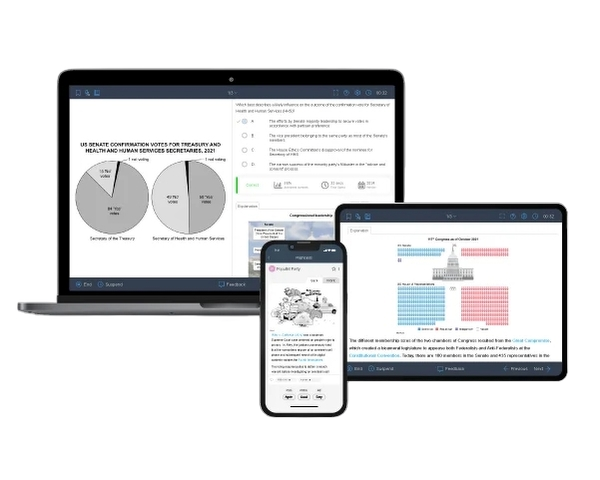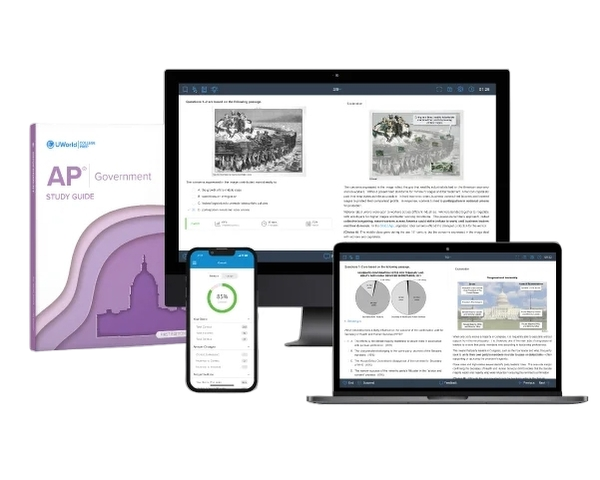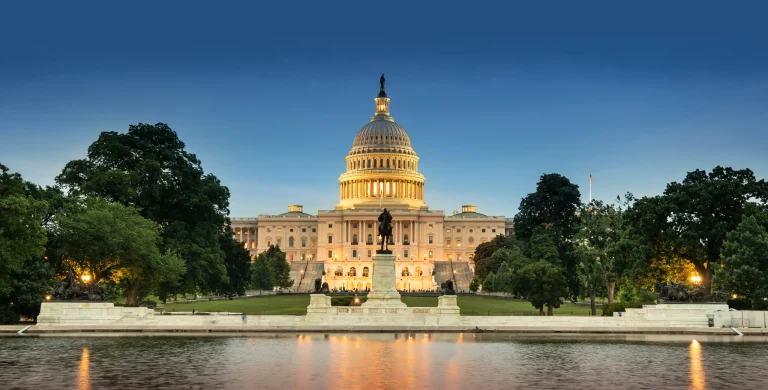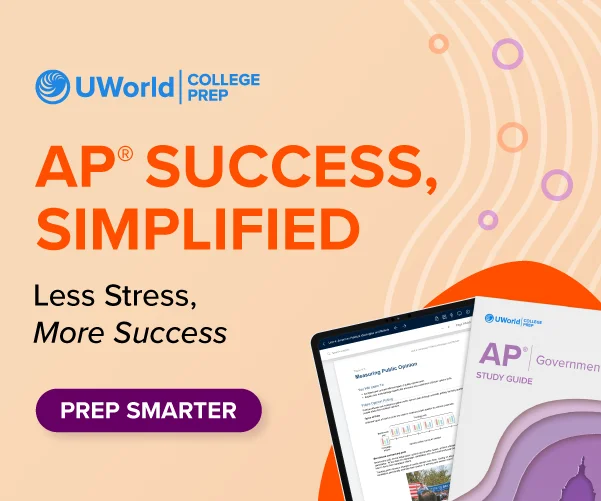In this guide, we will help you with every stage of the AP® Government prep process. From the moment you sign up for an AP U.S. Government and Politics course to exam day, you can take the following steps to prepare and improve your chances of getting your dream score.
AP U.S. Government is an expansive test covering political principles, processes, institutions, and actions. Preparing for the exam takes time but is easily doable when divided into small chunks. If you follow the steps below over the course of your AP Gov. semester or school year, you'll stand a good chance of attaining a passing score on the exam.
How to Study for AP Government and Politics Exam
AP U.S. Government and Politics is not as complex as some other AP courses and exams. With a bit of preparation and planning, you'll be able to do well in class and on the test.
How to Prepare for the AP United States Government and Politics
- Consider the following tips to prepare for AP U.S. Gov.:
- Do some summer reading of the foundational documents, such as the Constitution and Bill of Rights.
- Familiarize yourself with the course using College Board® resources.
- Talk to the AP teacher about what to expect in the class.
- During the school year:
- Carve out some daily time to read the textbook or review classroom notes. This class is a marathon, not a sprint. Cramming the night before won't help.
- Remember that you can't memorize every piece of content in AP U.S. Gov.
- Familiarize yourself with the foundational documents and required Supreme Court cases.
- Watch content-related videos (like Crash Course U.S. Government and Politics or Heimler's History).
- Practice timed writing to become familiar with free-response questions (FRQs) rubrics.
- Take practice tests (available through the College Board's website); these will help gauge your readiness.
- Use online resources for multiple-choice questions (MCQs), like UWorld for extra practice.
- Don't be afraid to ask your teacher or classmates for help.
How to Pass AP United States Government and Politics
With a little grit and practice, you can easily pass AP Gov. We've compiled a few important AP Gov tips you can use to prepare for your class:
- Study for at least 30 minutes each and every day.
- Keep up with the assigned reading.
- Practice your writing skills and familiarize yourself with the rubric.
- Find online and print resources, such as UWorld's AP U.S. Government online course.
- Two weeks before the exam, increase your study time to 1 hour a day, reviewing approximately half a unit daily.
- Ask the teacher for help and suggestions for how you can improve; they will be happy to help.
How to Do Well on the AP United States Government and Politics Exam
If you wish to aim high and go for a 4, you will need to focus on your study sessions and work on target areas that require improvement. A question we often get from AP students is if it is hard to get a 4 on the AP Gov exam. If you're asking yourself the same question, the answer is yes, but the below AP Gov exam tips can help you earn that score:
- Increase your study time to 45 minutes daily.
- Keep up with the assigned reading.
- Continue to use online test prep services, such as UWorld's AP Gov exam prep.
- Continue to practice your writing skills with timed writing.
- One month before the exam, increase study time to 1.5 hours daily.
- Ask the teacher for help and suggestions for how you can improve; they will be happy to help.
You can follow these tips even if you wish to improve your AP Gov exam score from a 3 to 4.
How Do I Get a 5 on the AP U.S. Government Exam?
If you're aiming for a 5, you will need a regular AP Gov study plan and practice. We have bulleted a few necessary steps to help you get there:
- Be prepared to study for 45 to 60 minutes daily.
- Keep up with the assigned reading.
- Make flashcards of important terms and processes, along with required Supreme Court cases and foundational documents.
- Increase the time you practice with online test prep services, such as UWorld's AP Gov exam prep, each week (in addition to regular reading and study time).
- Two months before the exam, increase your study time to 2 hours a day:
- Practice timed writing at least once a week.
- Ask your teacher for help and suggestions for how you can improve; they will be happy to help.
Which Units Are the Most Difficult or Complex?
According to the Chief Reader's report following the 2024 AP U.S. Gov. exams, student responses indicated difficulty with:
- Clearly demonstrating how to apply course concepts for a given scenario or data in the context of the scenario or the data presented
- Making meaningful connections between course concepts
- Drawing conclusions about how political processes cause various effects on political participation and policy
- Recalling course concepts and contrasting them with others
- Identifying key terms and concepts in a scenario or court case and analyzing their importance in the context of the question
- Following exam directions and answering the question that is asked
Some specific topics and concepts that students have historically struggled with are:
- Changes in federalism over time as a reflection of congressional acts and judicial rulings
- This topic has a complex history, as the relationship between the states and the national government has been defined and reshaped as Congress has expansively invoked its commerce power over time. At times, the Supreme Court has checked Congress' commerce power because the shape of federalism has evolved.
- The legislative process, including the role of committees, interest groups, party leadership, and agencies
- There are many different groups involved in the legislative process, and it is important to distinguish between them, to know what their roles entail, and how each affects the others through their interactions.
- The structure of the judicial appeals system
- Original and appellate jurisdiction is established in the Constitution. The Supreme Court hears most of its cases on appeal and often reverses lower courts' decisions. Many times, this creates new precedents that influence future cases.
- The differences and similarities between party identification and political ideology
- Students often view these as synonymous. While party identification and political ideology are closely related, parties (and party identification) tend to change more frequently, whereas ideology has deeper roots.
- Changes in campaign finance laws over time
- Since the dawn of modern campaign finance reform in the 1970s, there have been a number of twists, turns, and loopholes in the history of how money can be used to impact elections in the U.S. It can be difficult to understand the nuance of what is and isn't allowed as campaign finance laws change over time.
How Do I Self-Study for the AP U.S. Government and Politics Exam?
Self-studying for AP U.S. Gov is very common. However, it presents 2 major challenges:
- You will not have an AP teacher to guide you through difficult concepts.
- You will not have access to AP Classroom practice questions.
You can still prepare yourself to do well on the exam. Here are some resources that can make it easier:
- UWorld Question Bank
- College Board AP Daily Videos
- Printed Exam Study Guides

AP United States Government and Politics Study Exam Tips
- Take and score a practice test while meeting the exam time limits.
- Analyze what you got wrong.
- Categorize incorrect questions by units.
- Look for patterns as you study. Are you struggling with Supreme Court decisions? Did you miss questions related to campaigns and elections?
- Once you've found the problem areas, revisit your notes.
- Go back over your notes and textbooks, watch videos, and review class tests you've taken.
- Quiz yourself and make flashcards.
- Read the information out loud as your review (studies prove it's effective).
- Practice timed writing.
How Do I Plan My AP United States Government and Politics Study Schedule?
Below is a schedule for review at 2 months, 1 month, and 2 weeks. At the start of the plan you choose, take a practice exam to identify areas you need the most help on, so you can take extra care when reviewing. Review notes, readings, online review outlines, content videos, etc.
In the best-case scenario, you should start buckling down around spring break. If you've been feeling stressed by the rigor of an AP schedule, take a few days or the whole week to relax or vacation with family. It's important to avoid getting overwhelmed before the exam.
Now let's get started! Spend some time reviewing specific units for the first month or so leading up to the exam. Start with Unit 1 and work your way through the course material. Review your notes, complete practice questions on each topic, and note any areas that trouble you. Questions in your textbook can be great for skill-building if you need a refresher on main concepts; use UWorld MCQs and College Board FRQs for exam-level questions.
If you have access to AP Classroom, you may ask your teacher to provide you with some practice questions. Make some flashcards on key political processes and vocabulary if you haven't already. Here's a guideline for how much time to spend in each part of the course:
- Foundations (Unit 1): 1 week.
- Interactions Among Branches; Civil Rights & Civil Liberties (Units 2-3): 3 weeks.
- Political Beliefs; Political Participation (Units 4-5): 1 week.
- That leaves about 3 weeks until your exam date. Here's how you should spend that time:
- Take some time to review the concepts that gave you trouble during your unit review. Practice some more MCQs on those topics until you feel more confident.
- Now that you've targeted each individual unit, start mixing MCQs from multiple units. UWorld and AP Classroom both do this easily and intuitively.
- Use your flashcards daily to make sure you have the vocabulary down.
- Start timing your MCQs. The MCQ section averages 1.5 minutes per question. Some questions will take more time than others, but try to get close to those averages. See our AP U.S. Gov MCQ Guide for more information on improving performance.
- For FRQs, start taking FRQs beginning in 2019 and time yourself on those. See our AP U.S. Gov FRQ Guide for more information on tips for taking FRQs.
Also, consider other AP courses, if you have any. Make sure your schedule factors in time for all of them. For example, if you are taking four AP classes this school year, maybe devote half an hour to each one on weeknights and a couple of hours to each course on Saturdays. Find a schedule that allows you to spend enough time on each subject, and make sure you factor your other AP exam dates into your study schedule, too. Additionally, you'll also need to plan your schedule around any extracurricular activities and sports. Planning ahead is the key here.
One last important bit of advice: plan for breaks in your study schedule. You may not have time to take a day off, but you will learn and absorb information much better if you're well-rested. Take some time away from the material periodically to do something fun or completely unrelated. Either set a regular day in the week when you don't study, or learn to recognize when you're feeling burned out and take the afternoon off.
If you only have one month until the exam, you still have enough time to prepare. Like the 2-month schedule, you'll want to start with a general review of the course topics, unit-by-unit, but at a quicker pace. Use your textbook, class notes, and course materials if you need refreshers on the concepts, but spend most of your time completing your textbook practice problems or practicing with the UWorld QBank.
With UWorld, you can review the explanations of questions you miss and spend less time on the explanations of questions you understand. This approach of targeting the concepts you need most saves you time. Here's a general time frame breakdown:
- Foundations & Interactions Among Branches (Units 1 & 2): 1 week.
- Civil Rights/Civil Liberties, Political Beliefs, Political Participation (Units 3–5): 1 week.
For the remaining 2 weeks, alternate between drilling through questions across all units in UWorld and practicing FRQs. Time yourself on the FRQs to make sure you can pace yourself well, and if you consistently have time left over, spend that time reviewing your work.
With a 2-week schedule, time is much more limited. For the first week, practice a few UWorld MCQs in each topic to find your problem areas, read through the explanations, and review your class notes in those areas. Find a video or read your textbook on a topic if the information isn't sticking. After reviewing the problem area, try some more UWorld questions to see how you've improved.
For the second week, spend most of your time practicing FRQs. FRQs hit many topics simultaneously, so they are a very time-efficient way to practice the course material. They also often require you to show your steps, so they are a great way to emphasize the entire process of answering AP U.S. Gov questions.
See our proposed 2-week study schedule in the table below:
| Day 1 | Take a practice test |
| Day 2-3 | Review what you missed on the practice test |
| Day 4-5 | Review Unit 1 |
| Day 6-8 | Review Unit 2 |
| Day 9-10 | Review Unit 3 |
| Day 11-12 | Review Units 4 and 5 |
| Day 13-14 | Practice FRQs sticking to exam time limits |
AP United States Government and Politics Review/Study Materials
-
UWorld question bank
The questions available on the UWorld AP U.S. Government QBank are designed to provide you with the kinds of questions that you will see on the exam. In addition, each question fully explains why the right answer is right, and the wrong answer is wrong. This helps you identify inaccurate thought patterns and correct them before the exam.
-
College Board AP Daily videos
While you cannot access the practice materials on AP Classroom if you are studying independently for the AP Gov exam, you can watch the College Board's Live Review Videos for AP Gov that are available on YouTube. These videos walk you through MCQ and FRQ strategies to show you how to succeed in each exam section.
-
Printed & online exam study guides
Many printed resources can be found on Amazon and even at used bookstores. However, try to buy the most recently published versions available to you. Test questions change in subtle ways on a regular basis. Printed materials have a much harder time providing the most up-to-date information, whereas online resources often include the most current reflection of the actual test. However, UWorld's print and online AP U.S. Government study guides are designed to help you stand out. They come with up-to-date content, cover all units and topics thoroughly, and include check-for-understanding questions at the end of each unit to help you assess your knowledge.

References
- (2023). AP United States Government and Politics. apstudents.collegeboard.org. Retrieved February 17, 2025, from https://apstudents.collegeboard.org/courses/ap-united-states-government-and-politics
- (2023, Fall). AP United States Government and Politics Course and Exam Description .apcentral.collegeboard.org. Retrieved February 17, 2025, from https://apcentral.collegeboard.org/media/pdf/ap-us-government-and-politics-course-and-exam-description.pdf
Read More About AP United States Government and Politics
Many students find it difficult to answer FRQs adequately. For a step-by-step guide on successfully responding to AP U.S. Government & Politics FRQs, click here!
How to Approach AP United States Government and Politics MCQsHaving a hard time keeping up with the AP U.S. Government MCQ questions? We've compiled a comprehensive, practical guide to mastering various question types.
Free United States Government and Politics Practice QuestionsUWorld's free online AP mock tests are here! So, put your skills to practice with exam-like questions and see where you stand in the AP U.S. Government subject knowledge.
Best AP U.S. Government and Politics Study Guide ComparisonExplore top AP U.S. Government study guides to find the best resources for the exam. Compare features, pros, cons and reviews to select the perfect guide for success.
Best AP U.S. Government and Politics Prep Course ReviewDiscover the best AP U.S. Government prep courses available. Compare key features, pricings, reviews, and benefits to select the course that best fits your learning.
How to Self-Study for AP U.S. Government and PoliticsLearn effective tips and strategies to self-study for the AP U.S. Gov exam. Build confidence, master core concepts, and achieve a high score independently too.




